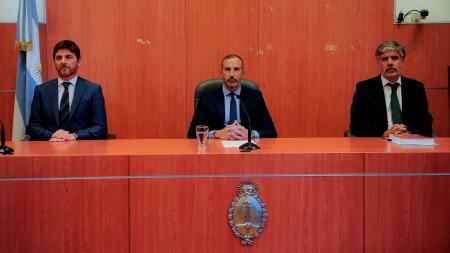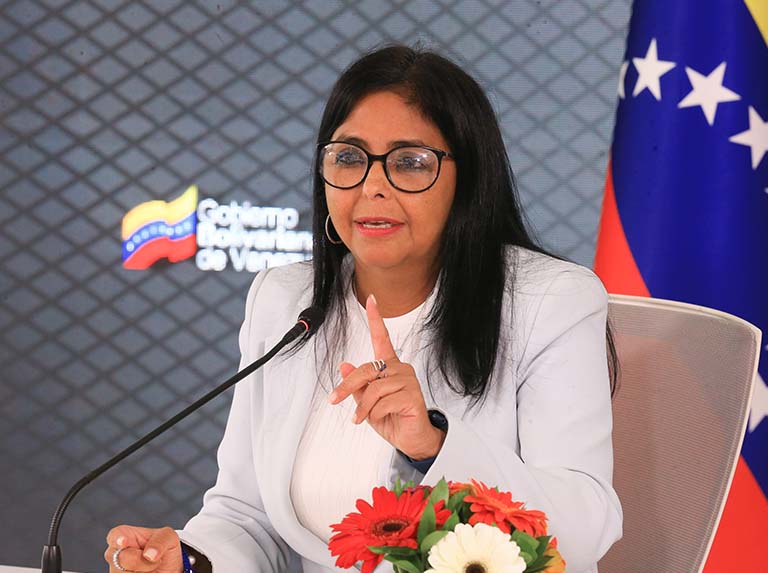On December 6, the Federal Criminal Oral Court (TOF) No. 2 announced its decision in case 2833: “Fernández de Kirchner, Cristina E. and others s/infraction articles 173, 174 and 210 of the Penal Code.”
As regards the Vice President, the three judges unanimously decided to sentence her to 6 years in prison, perpetual disqualification from holding public office and the costs of the trial, for considering her the author criminally responsible for the crime of fraudulent administration to the detriment of the public administration (articles 12, 19, 20, 29 -inc. 3°-, 40, 41, 45 and 174 -inc. 5° and last paragraph- according to 173 – inc. 7°- of the Penal Code; and 403, 530 and 531 of the Criminal Procedure Code).
By a majority of judges, his acquittal was resolved in order to charge the qualified crime of illicit association (article 210 of the Penal Code), whose unconstitutionality I will always find an opportunity to express bluntly.
A very elementary principle of the constitutional State to chain rationality consists of the foundation of judicial sentences.
In this singular case, in which for the first time since the restoration of constitutional democracy operated on 12/10/1983 a former President of the Republic (2007-2011 and 2011-2015) is convicted of fraud, said “foundations” recently They will be known in March 2023.
Strictly speaking, it is about the judicial interpretation of a procedural franchise, whose examination in accordance with the guidelines of the Highest Rule would not be easily passed. For now, in the face of said absence, the public will have to wait steadily until the end of the summer, which has not yet begun, to find out those foundations that seek to establish the judicial decision that has been made.
A whimsical inversion: in the beginning it was the verb of “condemnation”; then its foundations.
Knowing implies approaching human behavior empirically and/or rationally.
In this case, to the argumentation and subsequent decision-making justification of the sentence that the judges of the case must make with impartiality and objectivity; The Constitution obliges all magistrates to “administer justice well and legally” and in accordance with its entire text, in article 112.
Until this occurs, the following conjectures can be insinuated:
1
Any public work ordered by the President and Congress and for which the construction or renovation is determined for the benefit of the community is an eminent and exclusively political instance, which must be assumed by the strictly political powers and whose examination of opportunity, merit or convenience It is outside the powers of the Judicial Power of the Republic.
This is not an affirmation or a mere explanatory guideline, since it is an inalienable principle for the construction and maintenance of the constitutional State and of the inherent separation in the exercise of the functions of constituted power.
In other words, to build or not to build a public work is a competence that, in principle, is outside the power of judges and corresponds to a collegiate competence of the political departments of the Republic, Congress and the President.
Or would the public expect the routes, tunnels and bridges to be designed, addressed and approved by the judges?
two
Former President Cristina Fernández de Kirchner, upon being convicted of fraudulent administration, is blamed for the fact that her conduct was trapped in article 173, paragraph 7 of the Penal Code.
Thus, it is provided that those who “…by provision of the law, of the authority or by a legal act, are in charge of the management, administration or care of property or pecuniary interests of others, and with the purpose of procure for himself or a third party an undue profit or to cause damage, violating his duties, harming the entrusted interests or abusively obliging the owner of these”, all this by imperative of article 174, paragraph 5 also of the Penal Code: “the one who commits fraud to the detriment of any public administration”.
Did the then President Cristina Fernández de Kirchner have the exercise of the general administration of the country and the execution of the budget? Legally, did she have control over the situation or is she the politically responsible?
3
The federal Constitution reformed in 1994 has established, regarding the general administration of the Republic, the following unchangeable and guaranteed rules. The President, as determined in article 99, paragraph 1 of the Constitution, is the “politically responsible for the general administration of the country.”
However, the “Chief of Cabinet” is responsible for “exercising the general administration of the country”, “sending budget bills to Congress” and the “execution” of this very important law for the State, as established by the directives contained in Article 100, paragraph 6 and 7 of the Basic Law.
Human beings do not know if we are alone in the world or not, although it is very difficult for us to fall out of it.
In the world of constitutional law in Argentina, the President is not alone, because large segments of his powers (whose ownership is not disputed) have been discerned and decentralized in the person of a new public servant: the Chief of Staff.
4
The judges have announced a fraudulent act by the former President of the Republic. In order to reach that conclusion, the only feasible way to support their “good performance” jurisdictional that the Constitution requires of them, they must base, be honest, and be sincere in their vindictive reasoning that there is indubitable evidence that demonstrates a supposedly criminal plot.
A plan, in addition, in which the general administration of the country was owned or exercised, whose orbit was at the head of different people who held the position of Chief of Staff.
That must be the beginning of an expectable argument: without euphemisms, the judges must demonstrate, on the basis of their reasoning, the damage to the patrimony of Argentina.
Without patrimonial damage or prejudice, there is no crime and for this the emerging information from audiovisual or written communication services is not enough.
Conclusive and direct evidence must be found in the criminal case itself.
5
The public works were carried out and everything seems to suggest that they were immediately necessary for Argentina.
Its economic and financial design and conception have been detailed in the corresponding budget accounts and in the approval of the aforementioned investment accounts.
For the rest: is there expert evidence that demonstrates the origin and destination of the funds? Is there evidence that links damage or loss to the public treasury?
The experts were not objected? Have all the legislators of the federal Congress who approved the legal instruments invoked been summoned to the criminal process?
In a brutally inflationary economy, how do you calculate the expenses and investments leading to a criminal charge and what supports a conviction? What did the bidders of public works do when their proposals were not accepted in the different public tenders?
6
Argentina has neither the best nor the worst constitutional democracy, if perhaps, in some place and time, that conjunction has had or will have an enviable ecstasy.
Today marks its first 39 years, with its lights and shadows.
Democracy is a method for the configuration of public policies, tasks that should not be the object of persecution or denial or elaboration by the Judiciary.
This judicial process has vital legal relevance.
The leader of the constitutional process in Argentina is the President and it will always be that way, until further notice.
Their prosecution and criminal punishment acquires a global significance, because from now on, without a doubt, every public servant will think several times about the future scenarios of public works, essential in a developing country like Argentina.
7
The sentence of acquittal or conviction constitutes the decisive instance of the criminal process, which must be carried out in demonstrated compliance with all the constitutional guarantees that ensure the accused the inviolability and rationality in the exercise of the defense of his person and his rights. .
The sentences of the judges, the laws of Congress and the regulations of the President, as well as all other acts must be rational.
Rationality opts for a proposition of significant capitality: the fundamental law must be a product of “reason” about the states of affairs in the world that it should determine with its rules.
Therefore, according to the republican principle, article 1 of the Constitution, all government acts must be rational because this is how the directive of article 28 is fulfilled, that is, use the appropriate means to obtain the proposed ends.
Now, in its development, it can be insinuated that all the pieces of the Constitution system, once established, will demand a rationally justifiable exercise by all the powers of the State and also by the citizenry.
Regarding public servants, a minimum standard of reasonableness must be required of them in the acts or omissions of the areas under their charge in the Government.
8
The preparation of sentences or the drafting of laws and regulations that are not supported by rationality must be considered arbitrary because they are combined in scandal of the paradigm of reason with which all responsible citizens support the constitutional State.
Arbitrariness, in any of its channels (judicial, legislative or administrative) offers serious dangers for certainty in the Law, the key of the keys to community coexistence.
9
Arbitrary judgments entail a proper denial of the jurisdictional function.
Not every sentence is arbitrary. They are not merely wrong.
An arbitrary sentence must be manifestly vicious, by attributing criminal responsibility to a person who lacked control of the fact or whose factual assumptions lack support in the vivid reality of the judicial file.
Likewise, there will be an arbitrary sentence when a public servant is persecuted, due to their functions and without the itinerary of their conduct having been configured, with a prior nature by Congress, as criminal in nature.
It also involves a judicial arbitrariness to try a person on several occasions for the same, in whose previous instances his innocence had been consecrated.
10
Arbitrary sentences must be unsustainable in the constitutional State, because they manifestly involve a supine neglect in the correct realization of the Law or because they are unsuccessfully detached from the evidence of the cause.
When the foundations of the sentence are known, the appeals will begin.
These appeal instances will culminate in many years in the Supreme Court of Justice, a body that does not have deadlines to issue its sentences.
No one in their right mind can venture the year of the issuance of the final sentence.
The triumph of reason must always be the triumph of those who reason.
The Constitution is a reason for the facts: without reason there is mere judicial will, whose darkest destiny is judicial arbitrariness, a sentence without foundations.
In literature there is an unfinished masterpiece published posthumously, against the will of its author, which exhibits the bewilderment of the judicial function.
The federal Constitution does not authorize these excesses and absolutely censures the arbitrary judicial sentencing of an innocent person for acts that they did not commit or that do not constitute crimes.
It was exquisitely hinted at by the French philosopher Michel de Montaigne at the end of the 16th century, when he asked himself: “What truth is one limited by these mountains and what is a lie for the World beyond?”
(The author is a Doctor of Law, professor of Constitutional Law UBA)
















